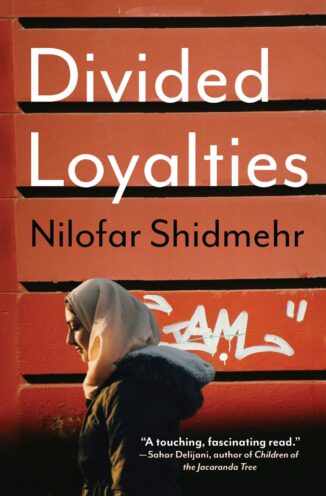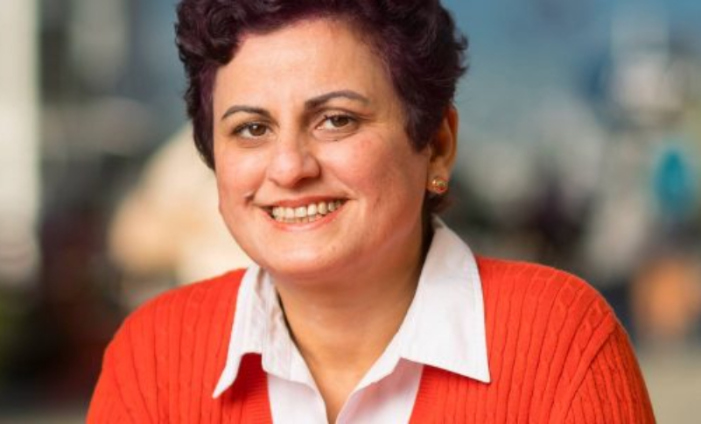In a story deep into Nilofar Shidmehr’s 2019 collection of short stories, Divided Loyalties, a woman meets a deaf bank teller. The character, an Iranian immigrant to Canada, imagines a world where she can communicate using sign language rather than English, and where her accent is no longer the first thing that others hear when she speaks. An aspiring writer, she revels in the fact that the teller has asked her to write her questions on a piece of paper, as writing, and writing in English, is a form of communication she excels at.
What follows is an exquisitely layered story about language, identity, desire, and imagination, all through the cultural lens of an Iranian immigrant. In between the bank transactions she requests from the teller, the woman envisions a love story between herself and the young man, one where “my accent won’t bother my lover.” The imagined love story is, as are many of the actions of the women in each of Shidmehr’s stories, an act of defiance against societal and cultural expectations, in particular those imposed on Iranian women before, during, and after the Iranian Revolution.
The 1979 Revolution saw the overthrow of the Shah, the head of the long-reigning Pahlavi dynasty, and the instituting of an Islamic republic under which women saw their freedoms increasingly restricted.
Though they feature unrelated characters and situations, the stories are organized chronologically in the book, going from the days just before the Revolution to the late 1980s after the end of the Iran-Iraq war, to the 1990s Canada and the Iranian diaspora, and finally the early 2000s in Iran. And if the focus of the stories is intimate and personal, the political and social context always loom large, forever shaping the bounds in which the female characters are allowed to move.
Expressing the untranslatable
Shidmehr, a mechanical engineer and poet in Iran before moving to Canada at age 28, describes herself as an exophonic writer. Exophonic writers are those who write creatively in a language other than their mother tongue. The term comes from the field of cultural and literary studies and was introduced by a group of German researchers in 2007.
But if the term is recent, the practice is not; in fact, many writers across history and nations have written in languages other than their own, many rising to literary renown for their work in their borrowed language. Some names include the 18th-century philosopher Voltaire, the Afghan-American novelist Khalid Hosseini, the Japanese-British writer Kazuo Ishiguro, and Canadian writer Nancy Houston (who writes in French).

Shidmehr’s prose in Divided Loyalties is both direct and densely impregnated in a sense of time and place, whether it’s the stories taking place during the dark and oppressive years of the Iran-Iraq war, the stories set in a sunny Vancouver, B.C., or the stories taking place in contemporary Iran. In many of the stories, Shidmehr also uses Farsi words instead of their English translation to name certain life states or objects of rituals, which helps the reader to be further immersed in the periods and spaces she recreates.
In the story “Let Go of My Hair, Sir!” (this title is itself translated from a Persian expression), the young protagonist, a mother of one who has moved to Canada as a refugee, rejects the notion of calling herself a ghorbaani—a victim. The word, like a reverse enchantment, is repeated several times throughout the story, each time revealing a new, even more poetic meaning. At the end of the story, we understand how much the young mother has survived, escaping her husband and the Islamic law that protected him to save their daughter after he had stolen her one night in a rage.
In “The Gordian Knot,” Pari, a divorced woman, sits in a dark theater watching footage of the aseers—the captive, hoping to catch a glimpse of her former husband Anoosh, a war prisoner in Iraq, as proof that he’s still alive. The word aseer then becomes not only a descriptive term but a container for all the meanings attached to the word: these are the war heroes, the men who have sacrificed everything for their country, and their sacrifice in post-revolutionary Iran always supersedes the sacrifices expected of Iranian women.
A fight to define their identities
While the collection provides an arresting, vivid look into the political and cultural events that have shaped Iranian society since the 1979 Revolution, its thematic thread remains the often opposing forces that Iranian women must navigate in a country that demands too much from its citizens. The political, the familial, the traditional, the female, and the personal all have their own demands, some of which come with a painfully steep price.
In “Divided Loyalties,” the story from which the collection takes its name, the protagonist is torn between her loyalty to the different factions of her family and her own need for independence. Back in Iran from Canada to attend her father’s funeral, Maana is pulled into a battle between her grieving, overbearing mother, her loving aunt Raazi on her father’s side, her brother’s need for her to keep a terrible secret, and her own grief and desires.
In another story, “Saving the Dead,” Maryam returns home from Canada to support the Red Cross in the aftermath of the earthquake that struck the city of Bam in southeastern Iran in 2003. While there, Maryam must decide if her loyalties lie with the old man who reminds her of her father or the young woman she and her Canadian Red Cross team are trying to rescue from under the debris. What Maryam discovers is that her vision of female self-determination and her definition of honour and duty, especially a daughter’s duty, painfully clash with the old man’s vision of women’s roles in Iranian society.
The question Shidmehr seems to ask is: after these women – these daughters, sisters, wives, mothers, lovers – have given away all their loyalties, what remains? The answer is complex and multifaceted, but also simple. It is whatever they want it to be as they search for love and happiness, be it in the relationships with their families, their lovers, or in their roles as mothers and daughters.
Divided Loyalties is Nilofar Shidmehr’s third book in English. It was published in 2019 by House of Anansi Press.
French Editor - Born in Venezuela, Andreina Romero is a freelance writer with New Canadian Media. Prior to writing for New Canadian Media, Andreina was a bilingual contributor at The Source Newspaper, also known in French as La Source, an intercultural newspaper in Vancouver. She is also the creator and host of the podcast Girls Talk About Music and Wigs and Candles which explore music and period films from a uniquely female and Latin American lens. In 2020, Romero also co-founded Identity Pages, a youth writing mentorship program.






[…] گزارش هفته و به نقل از newcanadianmedia، شیدمهر، مهندس مکانیک و شاعر ایرانی پیش از مهاجرت به […]